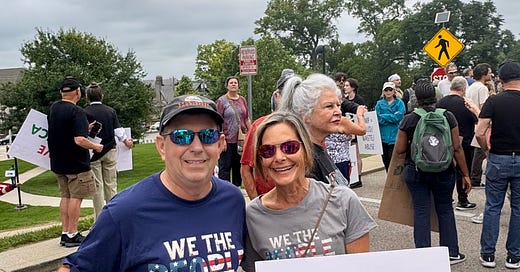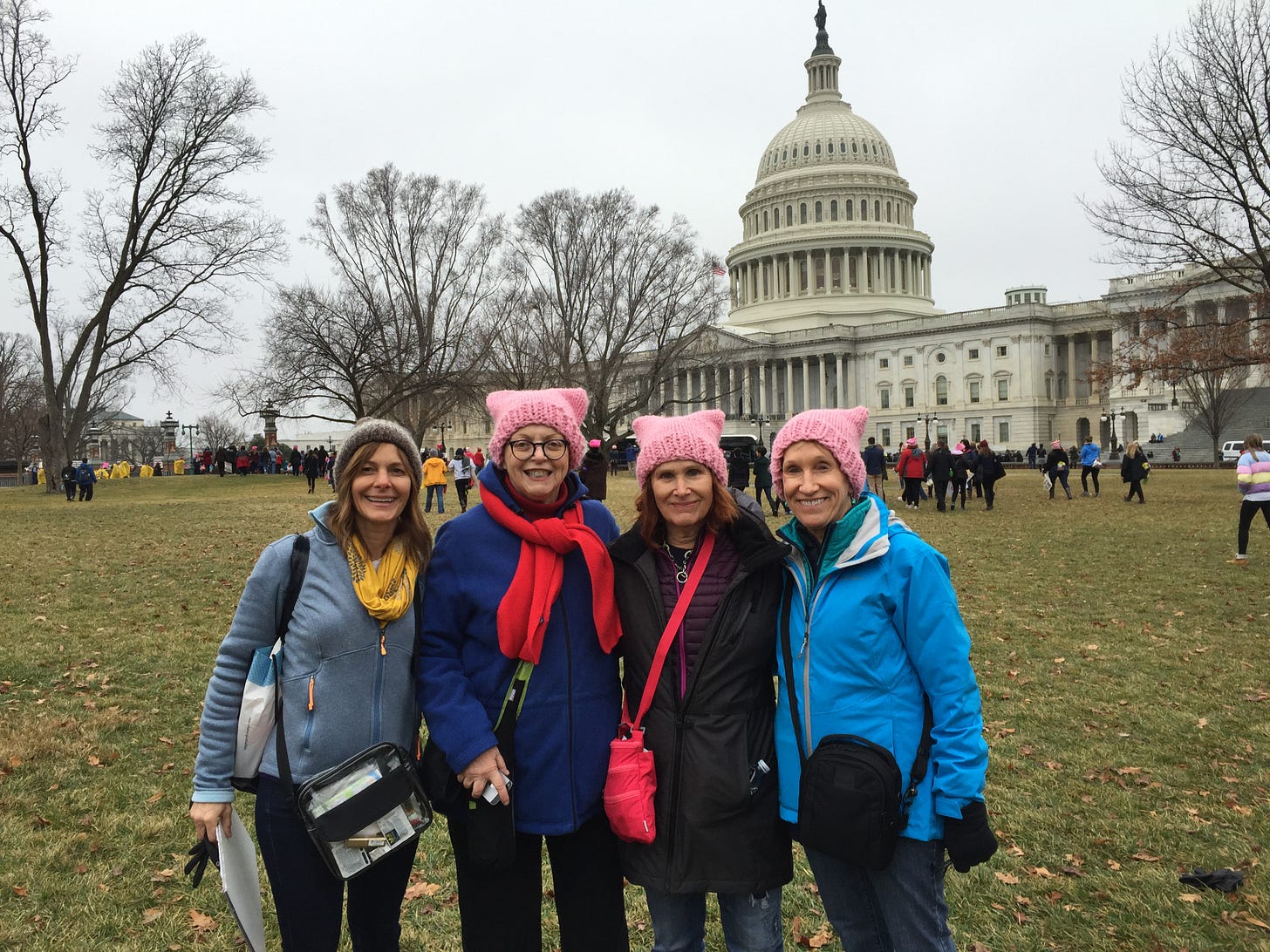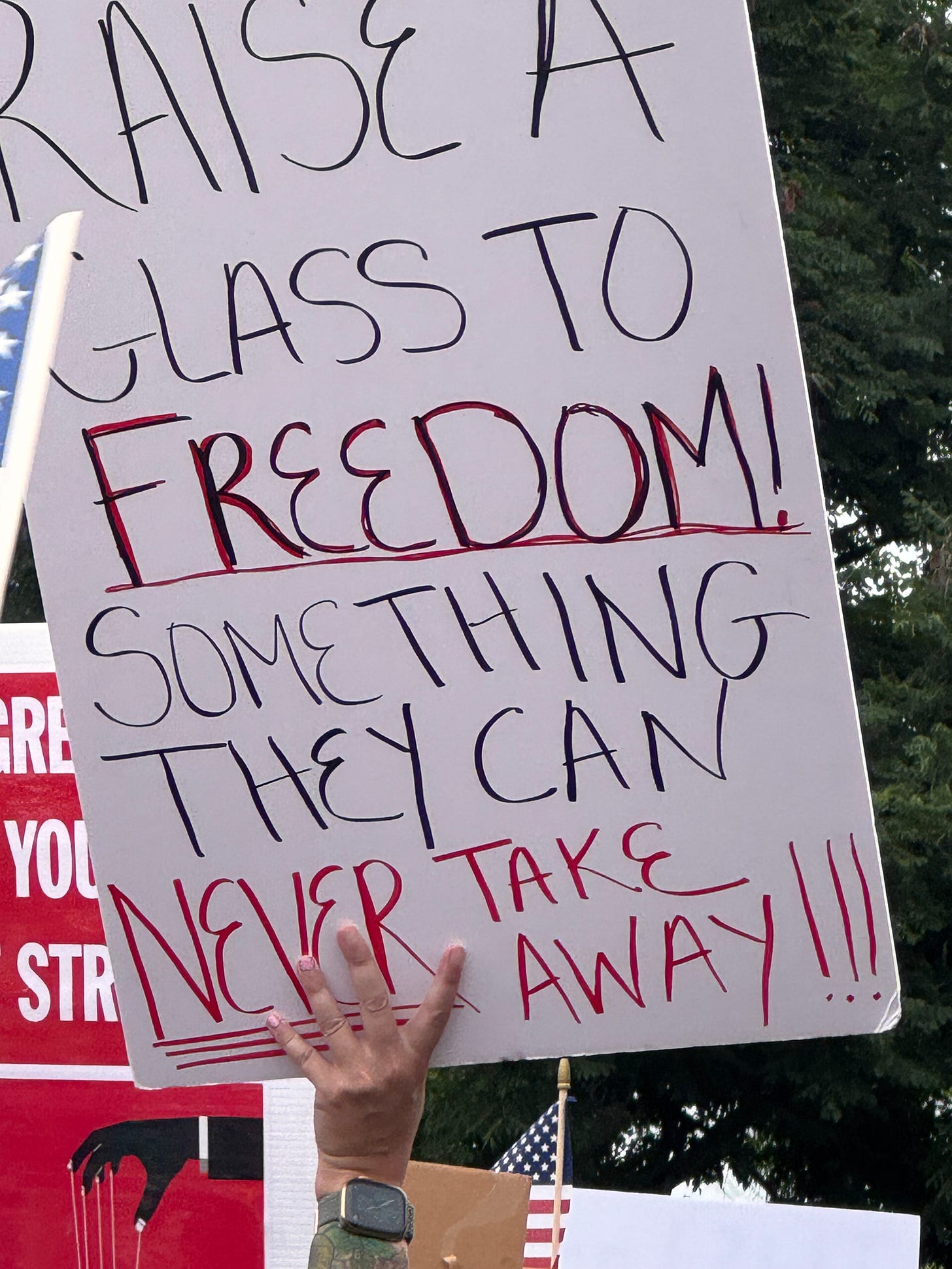Last Saturday, on a dingy gray humid day, my husband, a girlfriend, and I walked up University Circle for the “No Kings” protest. A black van pulled alongside the already crowded sidewalk. Two women began tossing out signs. The signs were everywhere. Leftover signs from previous protests. Newly printed ones. Some more apropos for the day’s theme, others remnants of L.A. or similar situations someone deemed necessary to save.
These women intentionally picked up signs to give to others for use. I don’t know if they marched that day or not, but plenty of signs carried their DNA with them.
What an abundance of generosity they left behind. So I wondered what else was left behind that day?
*
In 2017, I shipped off from Cincinnati to Washington D.C. on a mid-January morning bus that was loading quickly in the outer-ringed neighborhood of Mariemont. Alone because a friend of mine was grieving a death in her family, I nevertheless found friends and people whose names I recognized. One is never truly alone in these endeavors. This is the first lesson in advocacy. Sometimes it takes a half-million march of women to learn this. Or “roughly several thousand,” as the Cincinnati Enquirer reported had attended the University of Cincinnati-based “No Kings” march. Once you get past “three to five,” you’re not in the “several” department. Dayton had roughly “several” in that they had three thousand. Another lesson is to find a reporter with an understanding of crowd estimates. We gave ourselves a “7.” Seven thousand that day.
Living in the middle of the city, we’re accustomed to marches. I’ve marched for Black Lives Matter and against our country’s immigration policies. Sometimes out of convenience, I had to wonder, because marches began/ended somewhere near my home. I went to D.C. specifically because it was hardship for so many. Showing up is the third lesson in protesting, on behalf of those who have reason to fear doing so.
The night before the “No Kings” event, eating freshly baked chocolate chip shortbread cookies with friends in their lush garden, we debated on reasons why this Cincinnati-based protest wasn’t held in the downtown city area. In Washington Park, given the Over-the-Rhine neighborhood’s history of riots, gentrification, and other generational debates. The park is a lightning rod for protest and peace.
There’s a lovely bandstand which Bill Clinton paraded around when he campaigned for Hillary, months before that fated march. There’s a larger stage and speaker system where we’ve protested the previous mayor’s disparagement of the streetcar. There’s a neighborhood full of activists and those whose lives have been spent as the target of much derision. Even J.D. Vance took family photo ops there after his announcement as Trump’s running mate. There were all sorts of maybe reasons. None played out more logically than perhaps the city pushed the permit up the hill because the FC stadium was hosting FIFA’s Club World Cup the next day. They didn’t want to expose out-of-towners to…protesters? Another lesson in protesting. The city is like any good Italian family. Sweep the conflict under the rug.
*
Earlier in the day, my husband paced alongside his outdoor griddle, cooking bacon for a breakfast sammy. I went outside and handed him a plate. With no context, he said, “This is what happens. This is their plan to scare people off.” I had no idea what he meant. He pointed to the phone. A friend had cancelled a protest meetup (I’m second guessing my decision), my young niece, entertaining her visiting conservative grandmother from Florida, couldn’t to join us. She wrote, “stay safe.” They knew something I didn’t. The right-wing Proud Boys had announced, “Shoot a couple, the rest will go home.”
As much as the poor will always be with us, Jesus should have included bullies in his predictions.
The remainder of the morning, I checked my anxiety in the mirror, carefully tending to my clothing items for comfort, pulling my hair into a ponytail. I wanted to feel it all. To do so, setting my intentions for every breath and step provided me that opportunity. We were taking a chance, surely. When one considers the events in Minneapolis or Salt Lake city later reported on, no one should die for free speech and their representation of our country. No. One.
The crowds that gathered were a mixture of young and old. Mostly white. If I were a person of color, like another friend of ours who was in the US on a green card and declined to march, I would have stayed away too. That text from him, received as the march began, stuck with me. As did my Italian grandparents, who thanks to them, worked toward a life that beget mine. Whose Italian American peoples stood against the terrors of KKK, of which there were plenty in Northern Ohio (read Timothy Egan’s A Fever in the Heartland about the KKK’s infiltration of the Midwest). One of my favorite chants that day was No Trump, no KKK, no fascists USA.
Each roar of a chant rose and died down. A young woman in her 30s wearing a pink shirt would start another. She wasn’t carrying a sign or wearing a t-shirt. She carried herself with a confidence I envied. What was I doing my 30s? Was I in the streets? I wasn’t. But should have been.
Widowed and a single mom for a year, the events of September 11, 2001, and its aftermath, overshadowed my personal grief. The US invaded Afghanistan, targeting the Taliban regime and al-Qaeda. The US also invaded Iraq 2 years later. Meanwhile, I stashed loads of duct tape and an amateur radio below my bathroom vanity. Nothing felt more terrifying in the moment than being a single mom and wondering what happens next. The current Israeli strikes on Iran are equally disturbing for us all.
Meanwhile, our government has gone on the offensive—against those within our borders. Against persons of colors, immigrants, those on the margins, anyone who dares to ask what happens next?
*
In our household growing up, the raising of the flag was a solemn event. To the right of the door of our small ranch a flag holder had been nailed. In my father’s next garden, he raised marigolds, zucchini, and a flag pole. As an elementary student, I was picked to raise the flag each morning—for too many weeks. There was a certain pride contained in that ceremonial raising. Yet, lowering the flag at day’s end was also humbling. A sign of our democracy’s fragility. One only need access to the pulley system of ropes to bring it all down.
During the “No Kings” march, we talked about “taking back the symbolism of the flag.” My girlfriend also brought a sign printed off the Internet. I need to be able to tell my grandkids I did not keep silent. The write in me wanted to edit the phrase to I will tell my grandkids I did not stay silent. Our friend was popular that day, grandmothers appearing alongside wanting a photo with the sign. For that matter, my 86-year-old aunt marched elsewhere, accompanied by a 94-year-old. She knew what she would tell her grandchildren.
Texts came in from friends and family who had marched elsewhere. Our check-in, our commitment, our reminder. Whether marching with “several hundreds” in blue cities or protesting in the middle of a somewhere that produced a handful of heroic marchers in red states, confidence came from not feeling alone.
For a single instant in this moment of history, we could look around and convince ourselves we weren’t crazy to believe in more, better, greater than we ever dared believe for ourselves. We weren’t crazy to believe in a kindness that had been lowered like a flag.
There are places where we as a country are broken. If people admitted they too were broken, had been broken at some point in time by life, we could come together and move forward. How our president cannot in his heart find the bearings to be compassionate for the people shot in Minnesota (“Well, it's a terrible thing. I think he's a terrible governor. I think he's a grossly incompetent person. But I may, I may call him, I may call other people too," he said in an interview with ABC's Rachel Scott”), he has lost his way. His only purpose is to lead all of us into battle with other countries, with one another, with our deepest inner selves.
*
Days earlier, I sat in a meeting for The Lloyd Library and Museum, a world renowned independent research library and exhibit space devoted to bringing science, art and history to life. In an ideation session we were asked, what do we want people to know about the Lloyd? Currently, science funding and the fundamental belief in science as a life-affirming force are being batted around like a pickleball and tossed out of bounds.
What is contained within the Lloyd’s stacks and files are important. Years from now, the place will be a repository for truth. I shivered when someone spoke this notion this aloud. That fierceness in protecting our beings, past, present, and future, I carried into the march.
What is left behind, from all these protests? Certainly not the signs, as they will be rescued, gathered in a minivan, piled up for another day. The notion we are not alone. Numbers matter, so does showing up. Money tells all. No one should die from free speech and protests. We will tell our grandchildren we did not stay silent. The flag might be an indication of loyalty to the “crown,” but for those on the ground, it’s a symbol of humility and hard work. It’s ours to claim.
What else is left behind? A repository for the truth.
*
Did you march? What did you find “left behind?”
For more information, read my post from March, 2017, about the Women’s March.
What I’m reading (“have read”) this month?
My Documents by Kevin Nguyen. “The paths of four family members diverge drastically when the U.S. government begins detaining Vietnamese Americans, in this “rich, gripping novel that lands squarely as a mirror of our contemporary moral squalor” (Los Angeles Times). Lands squarely is the best description for this book. You won’t be able to “look away.’
King of Ashes by S.A. Cosby. Because it’s summer. And we all need a good time thriller. Think of Six Feet Under meets the Godfather.
The Next Day by Melinda French Gates. Because it’s short. It’s insightful. We’re the same age, and we lived through the early times of women working in a tech field. She outlasted me. But its her love for her father, who believed in women, like I believe my father did, that choked me up.
The Emperor of Gladness by Ocean Vuong. Brilliant. Small town brilliant. If you ever worked retail or fast food, you’ll see so much of yourself in this.
The Mother by Grazia Deledda. Originally published in 1920 and set in rural Sardinia, the story follows the life of a woman named Maria Maddalena, who is known as ""the mother"" in her village. Grazia Maria Cosima Damiana Deledda was an Italian writer who received the Nobel Prize for Literature in 1926 for her writings about life in Sardinia.
Lastly, a summer solstice blessing for all: “On this solstice, may you feel deeply connected to the world around you and to all living beings. May you experience a sense of unity and oneness, recognizing the interdependence of all life.”









Annette, I enjoyed your essay as I always do. We marched too, last Saturday and in DC in 2017, and many times in between. As you observed, we do it for the community and so we can tell our grandkids we were not silent. On Saturday, we marched with two of those grandkids, a three year old and a five year old. My favorite sign from the No Kings march read, "Not a paid protestor, I hate him for free." Keep writing, keep marching, keep your spirits up.
Bob Pickford
I, too, marched in Cincinnati. A wonderfully exhilarating experience. I feel I left my voice which shouted out slogan after slogan, telling the city, Country and world that we are not content with the way things are going. That voice, mixed with the thousands, will resound for years to come. Now we all must keep the action going!